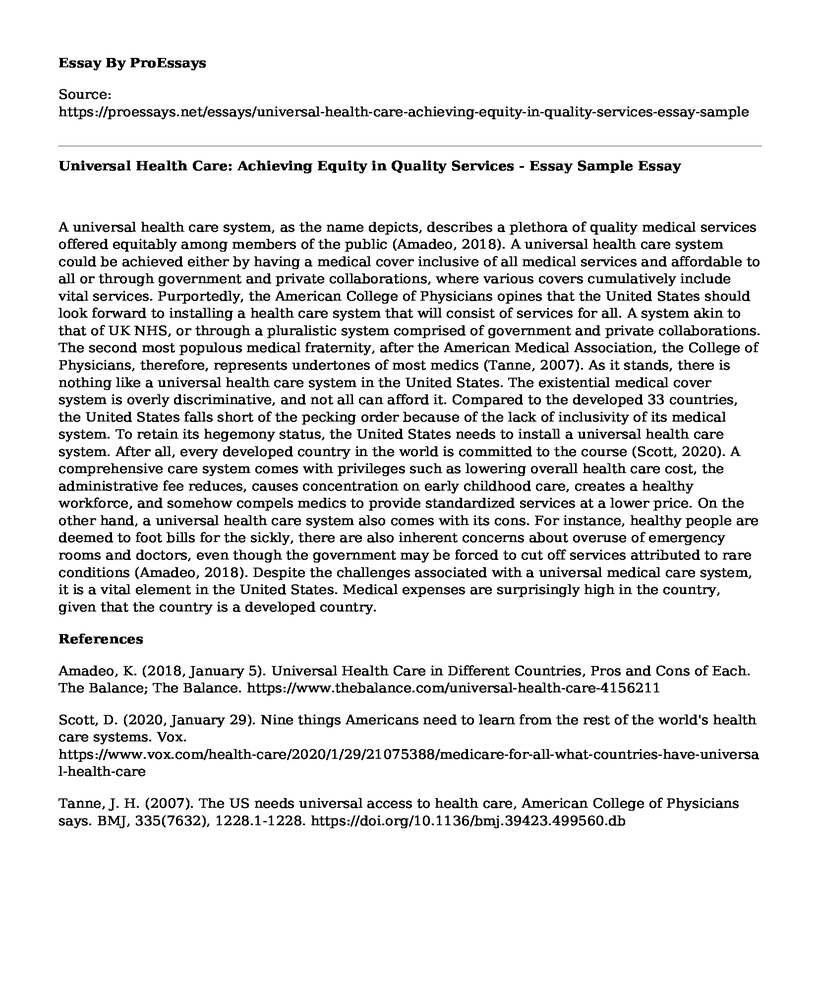A universal health care system, as the name depicts, describes a plethora of quality medical services offered equitably among members of the public (Amadeo, 2018). A universal health care system could be achieved either by having a medical cover inclusive of all medical services and affordable to all or through government and private collaborations, where various covers cumulatively include vital services. Purportedly, the American College of Physicians opines that the United States should look forward to installing a health care system that will consist of services for all. A system akin to that of UK NHS, or through a pluralistic system comprised of government and private collaborations. The second most populous medical fraternity, after the American Medical Association, the College of Physicians, therefore, represents undertones of most medics (Tanne, 2007). As it stands, there is nothing like a universal health care system in the United States. The existential medical cover system is overly discriminative, and not all can afford it. Compared to the developed 33 countries, the United States falls short of the pecking order because of the lack of inclusivity of its medical system. To retain its hegemony status, the United States needs to install a universal health care system. After all, every developed country in the world is committed to the course (Scott, 2020). A comprehensive care system comes with privileges such as lowering overall health care cost, the administrative fee reduces, causes concentration on early childhood care, creates a healthy workforce, and somehow compels medics to provide standardized services at a lower price. On the other hand, a universal health care system also comes with its cons. For instance, healthy people are deemed to foot bills for the sickly, there are also inherent concerns about overuse of emergency rooms and doctors, even though the government may be forced to cut off services attributed to rare conditions (Amadeo, 2018). Despite the challenges associated with a universal medical care system, it is a vital element in the United States. Medical expenses are surprisingly high in the country, given that the country is a developed country.
References
Amadeo, K. (2018, January 5). Universal Health Care in Different Countries, Pros and Cons of Each. The Balance; The Balance. https://www.thebalance.com/universal-health-care-4156211
Scott, D. (2020, January 29). Nine things Americans need to learn from the rest of the world's health care systems. Vox. https://www.vox.com/health-care/2020/1/29/21075388/medicare-for-all-what-countries-have-universal-health-care
Tanne, J. H. (2007). The US needs universal access to health care, American College of Physicians says. BMJ, 335(7632), 1228.1-1228. https://doi.org/10.1136/bmj.39423.499560.db
Cite this page
Universal Health Care: Achieving Equity in Quality Services - Essay Sample. (2023, Aug 27). Retrieved from https://proessays.net/essays/universal-health-care-achieving-equity-in-quality-services-essay-sample
If you are the original author of this essay and no longer wish to have it published on the ProEssays website, please click below to request its removal:
- Regulatory Requirements and Reporting of Managed Care Organizations
- Case Study Example: Health and Social Care for Carol's Family
- Research Paper on Nursing Theory, Roles and Values
- A Comprehensive Summary of My Dietary Intake: Tracking Progress Paper Example
- Essay Sample on Medical Ethics: Essential for Doctor-Patient Relationships
- Paper Example on Psychiatric Assessment: Finding the Right Treatment Plan
- Fostering Private-Public Partnerships: The People Concern's Mission to Address Social Challenges - Free Paper







